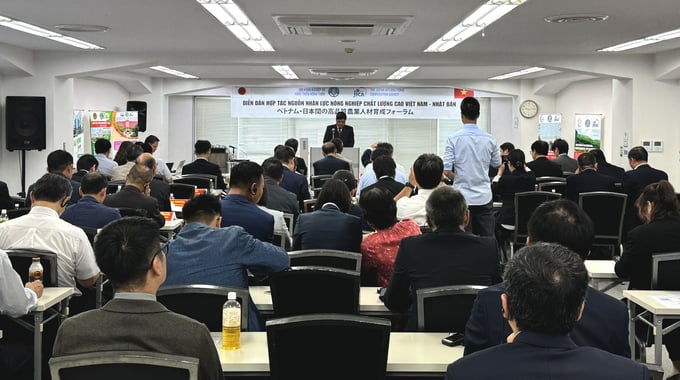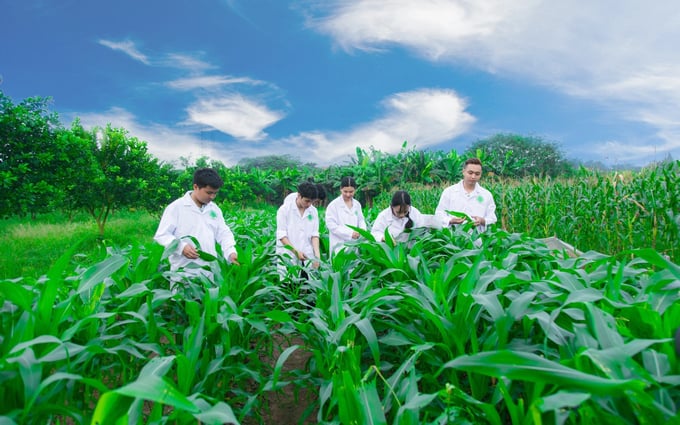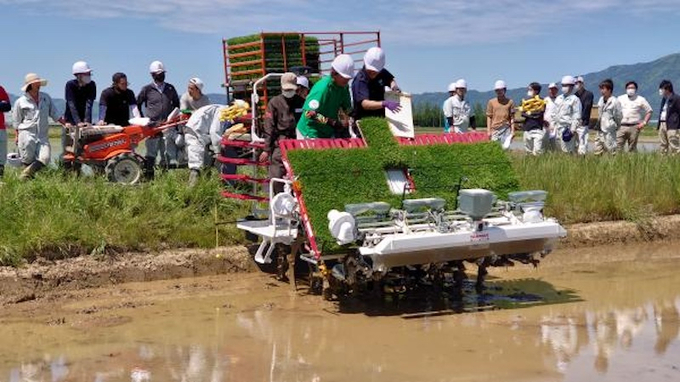May 18, 2025 | 20:39 GMT +7
May 18, 2025 | 20:39 GMT +7
Hotline: 0913.378.918
May 18, 2025 | 20:39 GMT +7
Hotline: 0913.378.918

The forum “Vietnam-Japan cooperation in high-quality agricultural human resources” took place on the morning of August 21 in Japan. Photo: Ngo Giang.
The "Vietnam - Japan High-Quality Agricultural Human Resource Cooperation" Forum was organized by the Ministry of Agriculture and Rural Development (MARD) in Tokyo, Japan, on the morning of August 21. The event was in collaboration with the Japan International Cooperation Agency (JICA).
Training institutions under the Ministry of Agriculture and Rural Development, as well as 10 Vietnamese enterprises, exchanged information regarding potential collaboration in scientific research, training, and the recruitment of high-quality agricultural laborers for employment in Japan through the Forum. Representatives from the Ministry of Agriculture, Forestry, and Fisheries of Japan, as well as the Labor Counselor and Trade Counselor of the Vietnamese Embassy in Japan, also attended the Forum.
Deputy Minister Tran Thanh Nam stated in his welcoming remarks that Japan has supported Vietnam in the application of modern technology and techniques, such as the construction of irrigation systems, the development of efficient irrigation systems, the application of advanced livestock and crop cultivation techniques, and the development of post-harvest processing and preservation technologies, since the establishment of official diplomatic relations.
"In terms of training and human resource development, Japan has also organized and trained many Vietnamese officials, engineers, and farmers, helping to enhance their knowledge and skills in applying new technologies in agricultural production," Deputy Minister Tran Thanh Nam underscored.
Currently, the world is confronted with a multitude of challenges, including a scarcity of high-quality human resources, an aging population, climate change, and agricultural security. Consequently, the collaboration between Vietnam and Japan is becoming increasingly necessary. In this context, the development of high-quality human resources, particularly in training, is a critical pillar for addressing both traditional and non-traditional challenges.
The Ministry of Agriculture and Rural Development's leadership stated, "The results of cooperation in training and supplying high-quality human resources have not yet met actual demands, in comparison to the potential and requirements for high-quality human resource development of both countries."

Vietnam Academy of Agriculture meets high-tech agricultural training requirements. Illustration photo.
Therefore, the Forum provided numerous mutually beneficial discussions that facilitated a more comprehensive comprehension of the fields of vocational training, university training, and postgraduate training. These fields are designed to satisfy employment needs in sectors where both nations possess strengths.
Five Vietnamese delegates, including Prof. Dr. Trinh Minh Thu, Rector of Thuyloi University, Prof. Dr. Pham Van Dien, Rector of Vietnam National University of Forestry, Prof. Dr. Pham Bao Duong, Rector of Bac Giang Agriculture and Forestry University, and Prof. Dr. Pham Van Cuong, Vice Director of Vietnam National University of Agriculture, presented on the opportunities for collaboration in agricultural training and research in Vietnam.
The recruitment needs and conditions for Vietnamese students and workers to work in factories, farms, food processing workshops, warehousing, and logistics were presented by Vietnam's Japanese partners, including JICA, Upraise Company, Hiroshima University, Miyazaki Prefecture, and several businesses. This was particularly relevant in light of Japan's aging and declining population.
Miyazaki is a province that is well-known for its agricultural and aquatic products. However, its population has declined from nearly 1.2 million in 2000 to 1 million in 2025, and it is expected to drop below 800,000 by 2045. This situation is also present in numerous other provinces and cities nationwide.

Niigata province has strengths in rice production and training of high-quality rice production human resources. llustration photo.
Consequently, Japan is experiencing a significant increase in the demand for foreign labor, particularly in the agricultural sector. Currently, Vietnamese laborers constitute the largest percentage of foreign labor in the agricultural sector of Miyazaki Province, with 36.2%, equivalent to over 2,500 people. Miyazaki Province has agreed with the Vietnam National University of Agriculture to facilitate the employment of students and employees in Japan.
In addition to collaboration in education and the utilization of human resources, organizations and municipalities in Japan are also exploring potential opportunities for collaboration in the areas of research and technology transfer. For instance, Niigata Prefecture operates an agricultural education platform that fosters collaboration among industry, education, finance, and local government to offer practical and diverse training.
Mr. Satoshi Koike, Director of Niigata's Agricultural Education Program, reaffirmed the shared strengths of Niigata Prefecture and Vietnam in rice production, as well as the shared objective of establishing a sustainable food system that is resilient to climate change, reduces greenhouse gas emissions, and employs integrated pest management. In his opinion, the utilization of technology and human resources in agriculture, particularly in the production of high-quality rice, will be facilitated by the experience of Japanese localities in Vietnam.
Translated by Linh Linh

(VAN) The decree on Extended Producer Responsibility (EPR) ensures transparent management and disbursement of support funds, avoiding the creation of a “give-and-take” mechanism.

(VAN) Hue City rigorously enforces regulations regarding marine fishing and resource exploitation, with a particular emphasis on the monitoring of fishing vessels to prevent illegal, unreported, and unregulated (IUU) fishing.

(VAN) Hanoi People's Committee has issued a plan on reducing greenhouse gas emissions in the waste management sector with 2030 vision.

(VAN) Vietnam's draft amendment to Decree No. 156 proposes a mechanism for medicinal herb farming under forest canopies, linking economic development to population retention and the sustainable protection and development of forests.

(VAN) In reality, many craft village models combined with tourism in Son La have proven effective, bringing significant economic benefits to rural communities.

(VAN) The international conference titled Carbon Market: International experiences and recommendations for Vietnam was successfully held recently in Ho Chi Minh City.

(VAN) According to the Project on rearranging provincial and communal administrative units, in 2025, the country will have 34 provinces/cities, 3,321 communes, wards, and special zones, and no district-level organization.